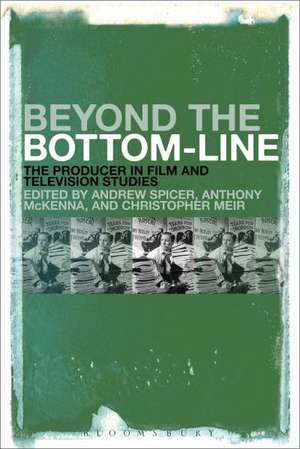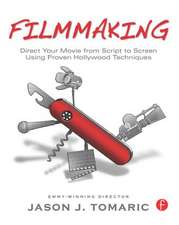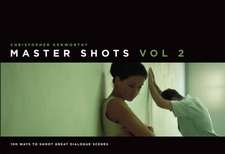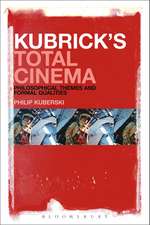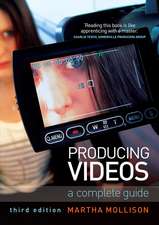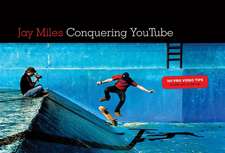Beyond the Bottom Line
en Limba Engleză Hardback – 30 iul 2014
Preț: 833.06 lei
Preț vechi: 1066.30 lei
-22% Nou
Puncte Express: 1250
Preț estimativ în valută:
159.42€ • 165.50$ • 132.93£
159.42€ • 165.50$ • 132.93£
Carte tipărită la comandă
Livrare economică 24 martie-07 aprilie
Preluare comenzi: 021 569.72.76
Specificații
ISBN-13: 9781441172365
ISBN-10: 144117236X
Pagini: 304
Ilustrații: 30 bw illus
Dimensiuni: 155 x 231 x 23 mm
Greutate: 0.57 kg
Ediția:New.
Editura: Bloomsbury Publishing
Locul publicării:London, United Kingdom
ISBN-10: 144117236X
Pagini: 304
Ilustrații: 30 bw illus
Dimensiuni: 155 x 231 x 23 mm
Greutate: 0.57 kg
Ediția:New.
Editura: Bloomsbury Publishing
Locul publicării:London, United Kingdom
Caracteristici
Explores the variety of roles producers play, providing insight into how the industry actually works
Notă biografică
Andrew Spicer, Professor of Cultural Production at the University of the West of England, UK, has published widely on British cinema, masculinity and film noir, most recently The Man Who Got Carter: Michael Klinger, Independent Production and the British Film Industry, 1960-1980, co-authored with A.T. McKenna. He is currently working on a study of Sean Connery. A.T. McKenna teaches Media and International Communications at the University of Nottingham in Ningbo, China. His work has appeared in the Historical Journal of Film, Radio and Television, Journal of British Cinema and Television, and the Journal of Popular Film and Television. He is currently working on a monograph on Joseph E. Levine. Christopher Meir is Lecturer in Film at the University of the West Indies, St. Augustine in Trinidad and Tobago. He edited a special issue of the Historical Journal of Film, Radio and Television on film marketing and has published on Jeremy Thomas. He is currently completing Scottish Cinema: Texts and Contexts.
Cuprins
Table of ContentsList of Illustrations Notes on Contributors Acknowledgements 1. Introduction – Andrew Spicer, A.T. McKenna and Christopher Meir Part I – Theoretical and Historical Contexts 2. Joe Kember, University of Exeter, UK, “A Judge of Anything and Everything”: Charles Urban and the Role of the “Producer-Collaborator” in Early British Film3. Audun Engelstad and Jo Sondre Moseng, Lillehammer University College, Norway, Mapping a Typology of the Film Producer – Or, Six Producers in Search of an Author4. Andrew Spicer, University of the West of England, UK, The Independent Producer and the State: Simon Relph, Government Policy and the British Film Industry, 1980-2005 5. Paul Long, Birmingham City University, UK and Simon Spink, UK, Producing the Self: The Film Producer’s Labor and Professional Identity in the UK Creative Economy6. Pauline Small, Queen Mary, University of London, UK, Producer and Director? Or, “Authorship” in 1950s Italian Cinema7. Mark David Ryan, Ben Goldsmith, and Stuart Cunningham, Queensland University of Technology, Australia, and Deb Verhoeven, Deakin University, Australia, The Australian Screen Producer in TransitionPart II – Media and Genre Contexts 8. Donna Kornhaber, University of Texas at Austin, USA, The Producer in Animation: Creativity and Commerce from Bray Studios to Pixar9. Brett Mills and Sarah Ralph, University of East Anglia, UK, “Trying to Ride a Naughty Horse”: British Television Comedy Producers10. Sonia Friel, Norwich University of the Arts, UK, Keith Griffiths’ Poetics of Production 11. James Lyons, University of Exeter, UK, The American Independent Producer and the Film Value ChainPart III – National and Transnational Contexts 12. Constanza Burucúa, Western University, Canada, Lita Stantic: Auteur Producer/Producer of Auteurs13. A.T. McKenna, University of Nottingham, China, Beyond National Humiliation: Han Sanping and China’s Post-Olympics Historical Event Blockbusters14. Gertjan Willems, Ghent University, Belgium, The Producer in Belgian Cinema(s): The Case of Jean (and Jan) Van Raemdonck15. Christopher Meir, University of the West Indies, St. Augustine, Trinidad and Tobago, Post-Imperial Co-Producers: Emile Sherman, Iain Canning and Contemporary Anglo-Australian Cinema
Recenzii
This will prove an invaluable book, both to students and to those wishing to learn more about the film and media industries. Its spread is broad, making comparisons between different countries, practices and genres, and yet its intellectual focus is precise and well-conceived. The work of the producer has received scant attention in the past, and this important book rectifies that, and in a thorough, sophisticated and approachable way. Not to be missed.
A pioneering and timely volume emphasizing historical and transnational perspectives, Beyond the Bottom Line brings the myths and realities of the producer’s many roles into clear focus. Offering well developed case studies and conceptual clarification, the contributors deepen and extend the ongoing conversation about practitioner’s agency in thoughtful and productive ways.
This long-overdue scholarly collection represents an important step forward in the study of the role of the movie producer. Beyond the Bottom Line is a welcome addition to the burgeoning literature of production and industry studies. Its broad range of critical case studies will be a valuable resource to researchers and students alike.
A pioneering and timely volume emphasizing historical and transnational perspectives, Beyond the Bottom Line brings the myths and realities of the producer’s many roles into clear focus. Offering well developed case studies and conceptual clarification, the contributors deepen and extend the ongoing conversation about practitioner’s agency in thoughtful and productive ways.
This long-overdue scholarly collection represents an important step forward in the study of the role of the movie producer. Beyond the Bottom Line is a welcome addition to the burgeoning literature of production and industry studies. Its broad range of critical case studies will be a valuable resource to researchers and students alike.
